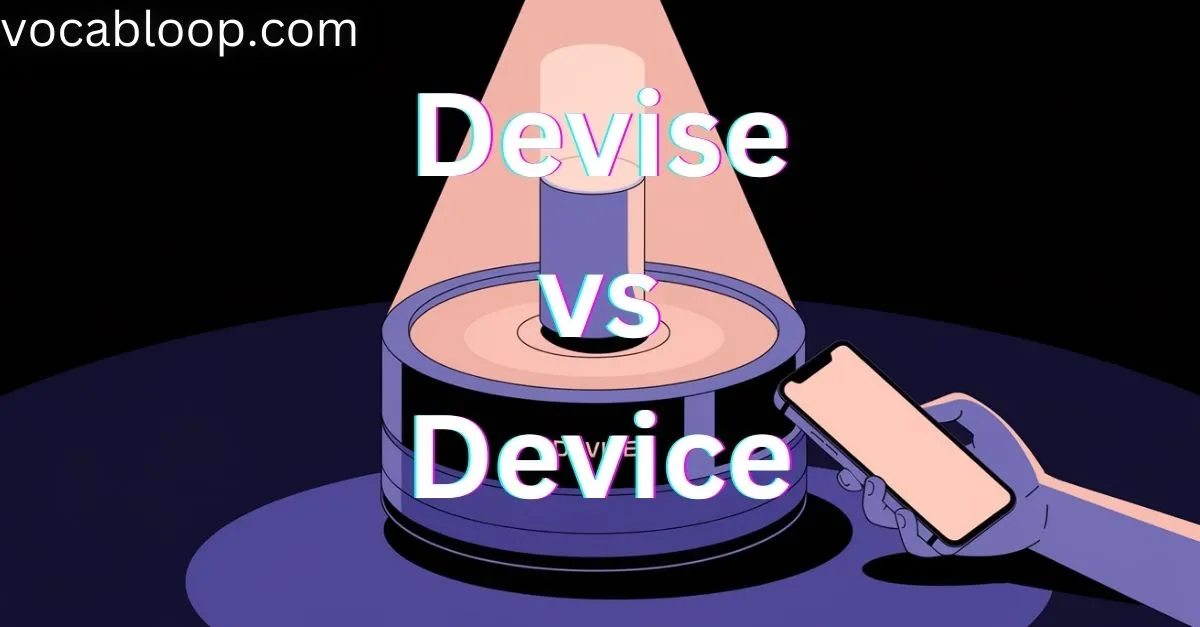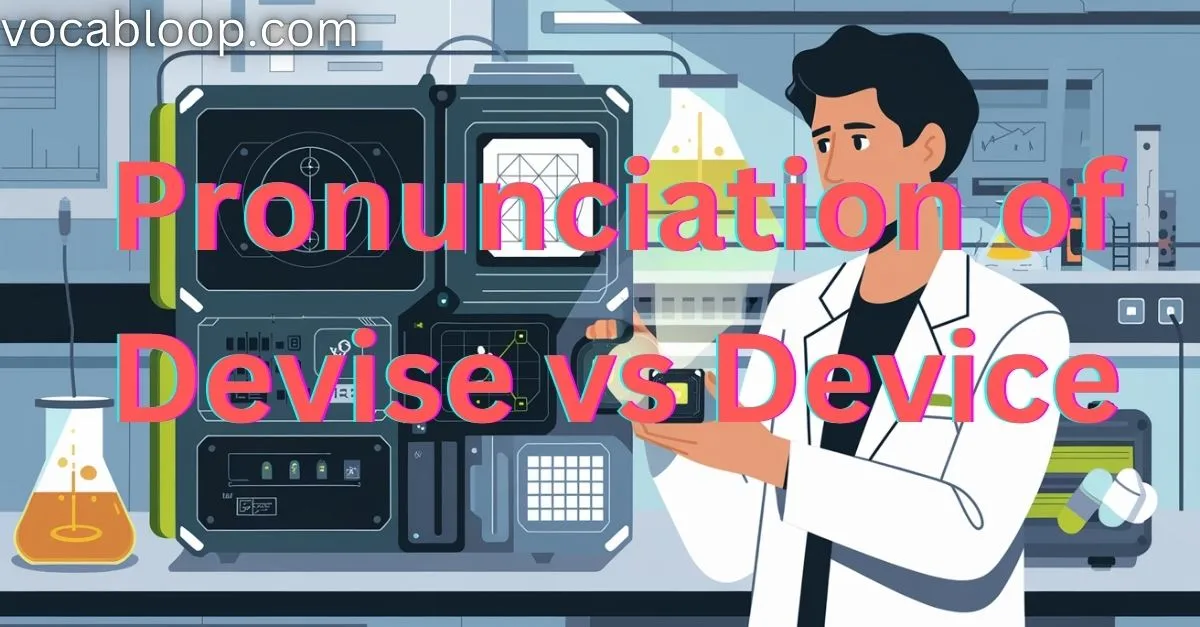English is full of words that sound similar yet mean entirely different things. One such pair is “devise” vs “device”. While their similar spelling can confuse even native speakers, these words have distinct roles in grammar, meaning, and usage.
If you’ve ever been unsure about the device and devise difference, this article will clarify everything you need to know. By exploring their definitions, meanings, and examples, we’ll ensure you never misuse these words again.
What Is There Confusion Devise vs Device?

The confusion between devise and device arises from their homophone-like nature. While not true homophones, their spelling difference is subtle, and their pronunciations can sound similar depending on regional accents. Both words share a common root in Old French and Latin, which contributes to their shared etymology and overlapping sounds.
This mix-up often occurs when people forget their parts of speech. “Devise” is a verb that describes the planning process or creating ideas, while “device” is a noun referring to a tangible object, often a gadget or tool. For example, saying, “I need to devise a device” uses both correctly but highlights their different roles. Without context, this pairing can feel confusing, leading to the misuse of one word for the other.
What Is the Devise?

Is the Devise Word Correct?
Yes, “devise” is a valid word in English. It serves as a verb and has a long history of use, especially in contexts involving strategy, problem-solving, and creativity. Its applications are broad, making it essential for both written and spoken English.
Definition:
The devise definition is “to plan, invent, or create something through thought or effort.” It is often linked to intellectual tasks or strategic thinking.
Meaning:
The meaning of “devise” can be understood as the act of forming a plan or method to address a challenge. It suggests deliberate, thoughtful action and is common in professional and academic writing. For example, devising a budget, strategy, or innovative solution are frequent uses.
Usage:
The word “devise” is often used in situations where creativity and foresight are required. For example:
- “The engineers had to devise a new solution to the problem.”
- “She will devise a plan to improve customer satisfaction.”
These examples show how “devise” emphasizes strategic usage and intellectual effort.
What Is the Device?

Is the Device Word Correct?
Absolutely, “device” is a correct and widely used word in English. Unlike “devise,” which is a verb, “device” is a noun that refers to objects, tools, or machines designed for specific purposes. Its meaning is central to discussions about technology and equipment.
Definition:
The device definition is “an object or tool created for a particular function.” It can refer to anything from simple mechanical tools to complex technological gadgets.
Meaning:
The meaning of “device” centers on tangible items used to achieve a specific goal. It often applies to technological tools, such as phones or computers, but can also include traditional equipment like levers or measuring instruments.
Usage:
“Device” is commonly used in both everyday conversation and technical writing. For instance:
- “The device measures blood pressure with high accuracy.”
- “Modern devices like smartphones have transformed communication.”
These sentences highlight the importance of context application and how “device” relates to equipment usage.
Quick Summary
To simplify, here’s a quick comparison of devise vs device:
| Aspect | Devise | Device |
| Part of Speech | Verb | Noun |
| Definition | To plan or create an idea | A tool or gadget |
| Meaning | Intellectual effort, strategy | Tangible item, technological tool |
| Usage | Strategic thinking, creative tasks | Physical objects, gadgets |
| Examples | Devise a strategy | Use a device like a smartphone |
This table captures the word comparison in a straightforward way, helping avoid confusion between the two.
Devise vs Device as Parts of Speech
The fundamental device and devise difference lies in their parts of speech. “Devise” is a verb, meaning to create ideas or strategize, while “device” is a noun, used for tools and equipment. Misusing these can disrupt clarity in writing. For example:
- Incorrect: “He devised a new device for thinking creatively.”
- Correct: “He devised a new device to simplify the process.”
Understanding this grammar contrast is crucial for maintaining linguistic clarity.
Pronunciation of Devise vs Device

The device pronunciation and devise pronunciation are slightly different. While they may sound similar in casual speech, paying attention to their phonetic differences can help you avoid mistakes.
- Devise: Pronounced “dih-VIZE,” with a “z” sound at the end.
- Device: Pronounced “dih-VISE,” ending with an “s” sound.
Practicing these pronunciations ensures speech articulation and reinforces their unique roles in language.
Side-by-Side Comparison Devise vs Device
Here’s a side-by-side breakdown to better understand the spelling difference and usage:
| Feature | Devise | Device |
| Pronunciation | Ends with a “z” sound | Ends with an “s” sound |
| Meaning | To plan or strategize | A physical tool or gadget |
| Context | Creative or intellectual | Mechanical or technological |
| Examples | Devise a solution | Use a medical device |
This word distinction clarifies their individual characteristics.
Which One Is More Acceptable: Devise vs Device?
Both words are equally acceptable, but only in their appropriate contexts. If you’re discussing strategic usage or intellectual tasks, “devise” is the right choice. On the other hand, when talking about tangible items like gadgets, “device” is correct. For instance:
- “We need to devise a method to reduce costs.”
- “This new device monitors heart health in real time.”
By focusing on the intended meaning, you can avoid common errors and enhance your writing.
Devise in British English and American English
The word “devise” remains consistent in both British and American English, meaning to plan or create. However, its usage may slightly differ based on regional phrases or cultural norms. British English often favors more formal expressions, while American English leans toward concise, practical language.
Device in British English and American English
Similarly, “device” holds the same definition across British and American English, referring to tools or equipment. The spelling and usage are identical, making it universally understood regardless of dialect.
Common Mistakes and How to Avoid Them
Confusion between “devise” and “device” often leads to grammar errors. For instance, using “device” as a verb or “devise” as a noun is incorrect. To avoid these mistakes:
- Remember that “devise” involves intellectual contexts like planning.
- Think of “device” as a tangible object like a phone or tool.
Trick to Remember the Difference Devise vs Device
A simple memory trick can help: “Devise” has “wise,” implying thought and planning. “Device” has “ice,” something tangible and concrete. Associating these words with their core characteristics makes it easier to remember their proper usage.
Origins of Devise vs Device

Devise:
The word “devise” comes from the Old French “deviser,” which means to plan or divide. Over time, it evolved to signify strategic planning or creative efforts.
Device:
“Device” originates from the Latin “divisus,” meaning divided or prepared. It later became associated with mechanical tools and equipment, emphasizing practicality.
Synonyms of Devise vs Device
Devise:
- Plan
- Invent
- Strategize
- Design
- Create
- Scheme
- Formulate
- Develop
- Imagine
- Construct
Device:
- Gadget
- Tool
- Instrument
- Apparatus
- Equipment
- Contraption
- Mechanism
- Machine
- Appliance
- Mechanism
Sentences in Daily Usage of Devise vs Device

Devise:
- The engineers devised a new method to reduce energy consumption.
- He spent hours devising a solution to the complex puzzle.
- The teacher devised a unique approach to make learning more engaging.
- She loves to devise innovative recipes for her food blog.
- They need to devise a strategy to win the upcoming election.
- The company is devising plans to expand into international markets.
- Scientists are working to devise new ways to combat climate change.
- She devised an escape plan when the power went out in the building.
- The committee is tasked with devising policies to improve public transportation.
- The author devised an intricate plot for her latest mystery novel.
Device:
- The smartphone is the most popular device for accessing the internet today.
- He bought a wearable fitness device to track his daily activities.
- This small device can detect gas leaks in your home.
- The device helps doctors monitor patients’ heart rates in real time.
- She connected the new audio device to her laptop.
- Engineers are testing a groundbreaking device to generate clean energy.
- The company launched a new device that simplifies home automation.
- This wearable device measures your blood oxygen levels accurately.
- He used a tracking device to locate his lost luggage.
- The police recovered a stolen device from the suspect’s car.
FAQs
What is the main difference between devise and device?
The primary difference is their parts of speech. “Devise” is a verb that means to plan or create something, while “device” is a noun referring to a physical object, often a gadget or tool.
Can “devise” be used as a noun?
No, “devise” is exclusively a verb. Using it as a noun would be grammatically incorrect. If you need a noun, “device” is the correct choice.
What are examples of “device” usage in technology?
Examples include smartphones, wearable health monitors, GPS systems, laptops, and smart home devices. Each of these is a tangible tool designed for a specific purpose.
How do you pronounce “devise” and “device”?
- Devise: Pronounced as “dih-VIZE” with a “z” sound at the end.
- Device: Pronounced as “dih-VISE” with an “s” sound at the end.
Practicing these subtle differences improves speech clarity.
What are tricks to avoid confusion between devise and device?
To remember, associate “devise” with “wise,” symbolizing strategic thought. Think of “device” as something tangible, like a tool or machine, that you can hold or use.
Conclusion
Device and Devise difference is essential for clear and precise communication. The two words may seem alike, but their meanings, uses, and pronunciations set them apart. “Devise” focuses on planning, strategy, and creativity, while “device” represents tangible objects, tools, and technology.
Mastering their differences ensures you never stumble in writing or speaking. With these tips, examples, and clarifications, you’ll navigate these terms like a pro and elevate your language skills!

Alex Hormozi is a seasoned blogger at Vocab Loop, known for his deep insights into language, vocabulary, and grammar. With years of experience in writing, Alex shares practical tips and effective strategies to help readers improve their linguistic skills and enhance their writing abilities.

